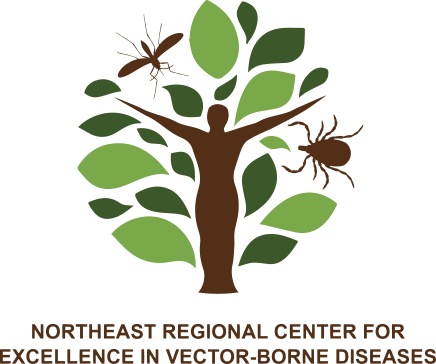
Applied Research & Evaluation Projects
NEVBD supports a variety of innovative projects that directly evaluate new and existing strategies for vector-borne disease monitoring, prediction, and control.
Learn more about our supported projects as a Training and Evaluation Center, as well as completed efforts from our prior funding periods.
Training Initiatives
Academic Training Programs
NEVBD-TEC supports several initiatives to expand academic training for the next generation of public health entomologists.
- Summer undergraduate internship program
- Vector biology curriculum development with local colleges and universities
- Resource compendium development of vector biology training materials
- National working group for public health entomology training
Professional Training Programs
NEVBD-TEC is committed to providing continuing education and professional development opportunities that meet the needs of our regional workforce at low- to no-cost.
- Vector Biology Boot Camp
- Online webinars and seminars
- Mosquito identification course
- Hands-on workshops hosted in partnership with regional vector control associations
Evaluation of Tools and Strategies
NEVBD-TEC supports two primary arms of our evaluation portfolio:
Supporting Partnership & Collaborations
The work we do at NEVBD-TEC could not be done without the support and collaboration of our regional and national partners.
We are excited to lead and participate in multiple collaborative groups working on the shared goal of protecting human health from vector-borne illness.
National Working Groups
- Insecticide Resistance Working Group
- Social Science for Vector-Borne Disease Prevention Working Group
- Public Health Entomology Training Working Group
Regional Working Groups & Association Partners
- Northeast Arbovirus Surveillance Situational Awareness Roundtable
- New Jersey Mosquito Control Association
- Northeastern Mosquito Control Association
- Pennsylvania Vector Control Association
- Viriginia Mosquito Control Association
Completed Projects
From 2017 – 2022, NEVBD collaborators conducting applied research to develop and evaluate new strategies for vector-borne disease monitoring, prediction, and control. Our applied research agenda during this time focused on the following areas:
- Changing climate and disease risk
- Monitoring trends and predicting spread through surveillance and modeling
- Vector competence and genetic diversity for pathogens and vectors
- Vector biology, behavior, and ecology
- Improving tools for surveillance and control of tick and mosquito vectors
You can learn more about the research teams and projects supported during from 2017 – 2022 by visiting our Completed Projects page.
